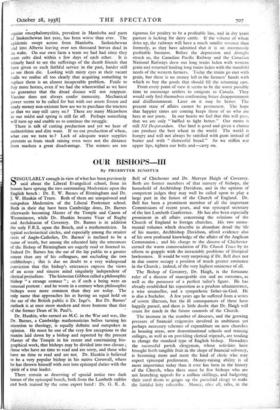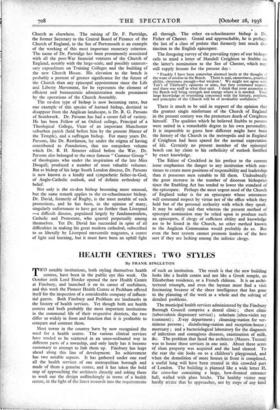OUR BISHOPS HI
By PRESBYTER IGNOTUS
SINGULARLY enough in view of what has been previously said about the Liberal Evangelical school, from its bosom have sprung the two outstanding Modernists upon the English bench : Dr. E. W. Barnes of Birmingham and Dr. J. W. Hunkin of Truro. Both of them are unequivocal and outspoken Modernists of the Liberal Protestant school. Both in their day have been Cambridge dons, Dr. Barnes afterwards becoming Master of the Temple and Canon of Westminster, while Dr. Hunkin became Vicar of Rugby and Archdeacon of Coventry. Dr. Barnes is in addition the only F.R.S. upon the Bench, and a mathematician. In typical ecclesiastical circles, and especially among the straiter sects of Anglo-Catholics, Dr. Barnes' is inclined to be a name of wrath, but among the educated laity the utterances of the Bishop of Birmingham are eagerly read or listened to. Indeed Dr. Barnes has the ear of the lay public to a greater extent than any of his colleagues, not excluding the two archbishops ; this is due no doubt to a very widespread conviction that this bishop's utterances express the views of an acute and sincere mind singularly independent of clerical prejudices. The historian Gibbon called a philosophic bishop " a strange centaur " ; as if such a being were an unusual portent : and he wrote in a century when philosophic bishops were more common than they are today. The only_ name that approaches his as having an equal hold on the ear of the British public is Dr. Inge's. But Dr. Barnes' outlook is at once more modern and more humane than that of the former Dean of St. Paul's.
Dr. Hunkin, who earned an M.C. in the War and was, like Dr. Barnes, a Cambridge mathematician before turning his attention to theology, is equally definite and outspoken in opinion. He must be one of the very few exceptions to the maxim laid down by a bishop and reported by the present Master of the- Temple in his recent and entertaining bio- graphical work, that bishops may be divided into two classes ; those who have no time to read and are sorry, and those who have no time to read and are not. Dr. Hunkin is believed to be a very popular bishop in-his native Cornwall, where he has thrown himself with zest into episcopal duties with the spirit of a true leader.
There remain as deserving of special notice two dark horses of the episcopal bench, both from the Lambeth stables and both trained by the same expert hand : Dr. G. K. A: Bell of Chichester and Dr. Mervyn Haigh of Coventry. Both are former members of that nursery of bishops, the household of Archbishop Davidson, and in the opinion of competent judges they may well be called upon to play a large part in the future of the Church of England. Dr. Bell has been a prominent member of all the important Commissions of recent years, and was episcopal secretary of the last Lambeth Conference. He has also been especially prominent in all affairs concerning the relations of the Church of England to foreign churches. His two monu- mental volumes which describe in abundant detail the life of his master, Archbishop Davidson, afford evidence also of his own profound knowledge of the affairs of the Anglican Communion ; and his charge to the diocese of Chichester earned the warm commendation of The Church Times by its efforts to grapRle with the intractable problems of liturgical lawlessness. It would be very surprising if Dr. Bell does not in due course occupy a position of much greater eminence in the Church ; indeed, of the very highest eminence of all.
The Bishop of Coventry, Dr. Haigh, is the fortunate ruler of a diocese of manageable size and no extremes, as well as the possessor of a perfect tailor's figure. He has already established his reputation as a prudent administrator, a wise counsellor, and a sympathetic father-in-God. He is also a bachelor. A few years ago he suffered from a series of severe illnesses, but the ill consequences of these have happily passed, and there is little doubt that Dr. Haigh will count for much in the future counsels of the Church.
The increase in the number of dioceses, and the growing pressure of financial exigencies involved in ambitious yet perhaps necessary schemes of expenditure on new churches in housing areas, new denominational schools and training colleges, as well as on providing clerical stipends, are tending to change the standard type of English bishop. Nowadays the successful parish clergyman, whose activities have brought forth. tangible fruit in the shape of financial solvency, is becoming more and more the kind of cleric who may expect episcopal preferment. Money-raising ability is of more importance today than it ever has been in the history of the Church, when there must be few bishops who are not launching appeals for a million shillings, and badgering their rural deans to ginger up the parochial clergy to make the faithful laity subscribe. Money, after all, talks, in the Church as elsewhere. The raising of Dr. F. Partridge, the former Secretary to the Central Board of Finance of the Church of England, to the See of Portsmouth is an example of the working of this most important monetary criterion. The name of Dr. Partridge has been prominently associated with all the post-War financial ventures of the Church of England, notably with the large-scale, and possibly unneces- sary expenditure on Training Colleges and the building of the new Church House. His elevation to the bench is probably a portent of greater significance for the future of the Church than any episcopal appointment since the Life and Liberty Movement, for he represents the element of efficient and bureaucratic administration made prominent by the operations of the Church Assembly.
The ex-don type of bishop is now becoming rarer, but one example of this species of learned bishop, destined to disappear from the Anglican landscape, is Dr. R. G. Parsons of Southwark. Dr. Parsons has had a career full of variety. He has been Fellow of an Oxford college, Principal of a Theological College, Vicar of an important Manchester suburban parish (held before him by the present Master of the Temple), and a suffragan bishop. For many years Dr. Parsons, like Dr. Rawlinson, lay under the stigma of having contributed to Foundations, that too outspoken volume which Dr. B. H. Streeter edited before the War. Dr. Parsons also belonged to the once famous " Cumnor Group " of theologians who under the inspiration of the late Miss Dougall, produced a number of most valuable volumes. But as bishop of his large South London diocese, Dr. Parsons is now known as a kindly and sympathetic father-in-God, of Anglo-Catholic outlook, and of definite orthodoxy of belief.
Not only is the ex-don bishop becoming more unusual, but the same remark applies to the ex-schoolmaster bishop. Dr. David, formerly of Rugby, is the most notable of such promotions, and he has been, in the opinion of many, singularly unfortunate to have got no further than Liverpool —a difficult diocese, populated largely by fundamentalists, Catholic and Protestant, who quarrel perpetually among themselves. Yet Dr. David has succeeded in spite of all difficulties in making his great modern cathedral, subscribed to so liberally by Liverpool mercantile magnates, a centre of light and learning, but it must have been an uphill fight all through. The other ex-schoolmaster bishop is Dr. Fisher of Chester. Genial and approachable, he is perhaps the last of a class of prelate that formerly lent much dis- tinction to the English episcopate.
The foregoing survey of the prevailing types of our bishop, calls to mind a letter of Mandell Creighton to Stubbs on the latter's nomination to the See of Chester, which may still supply lessons for the present day : " Frankly I have been somewhat alarmed lately at the thought the want of wisdom in the Bench. There is zeal, earnestness, practical ability, cleverness enough—but wisdom ! We might not agree with Tait's of Thirlwall's opinions or aims, but they command respect. and there was stuff in what they said. I think that your accession t,) the Bench will bring strength and energy where it is needed. Your large knowledge of everything concerned with the history, position, and principles of the Church will be of invaluable usefulness."
There is much to be said in support of the opinion that the greatest single misfortune of the Church of England in the present century was the premature death of Creighton himself. The qualities which he believed Stubbs to possess were united in a remarkable degree in his own personality. It is impossible to guess how different might have been the history of the Church in the metropolis and in England if Creighton had been spared for the normal expectation of life. Certainly no present member of the episcopal bench can lay claim to his catholicity of outlook fortified by exact knowledge.
The Editor of Crockford in his preface to the current issue emphasises the danger to any institution which con- tinues to create more positions of responsibility and leadership than it possesses men suitable to fill them. Undoubtedly the great increase in the number of diocesan bishoprics since the Enabling Act has tended to lower the standard of the episcopate. Perhaps the most urgent need of the Church of England today is for an episcopate whose utterances will command respect by virtue not of the office which they hold but of the personal authority with which they speak. It may be safely said that whereas the present method of episcopal nomination may be relied upon to produce such an episcopate, if clergy of sufficient ability and knowledge are to be found in the Church, no other method known to the Anglican Communion would probably do so. But even the best system cannot promote leaders of the best sort if they are lacking among the inferior clergy.

























































 Previous page
Previous page